Organizational Ethical Risks Influencing Performance: Research Report
VerifiedAdded on 2020/03/04
|5
|1023
|49
Report
AI Summary
This report presents a research outline examining the impact of ethical risks on organizational performance. The study aims to assess these risks, identify challenges in their management, and establish suitable mitigation measures. The research questions explore the existence of ethical risks, challenges in management, and effective mitigation strategies. The justification highlights the importance of business ethics, employee behavior, and organizational culture. The methodology involves a literature review and a mixed methods approach, including structured interviews with top managers. The research schedule and budget are also provided, detailing the timeline and costs associated with the project. The report concludes with the importance of ethical risks management in organizations.
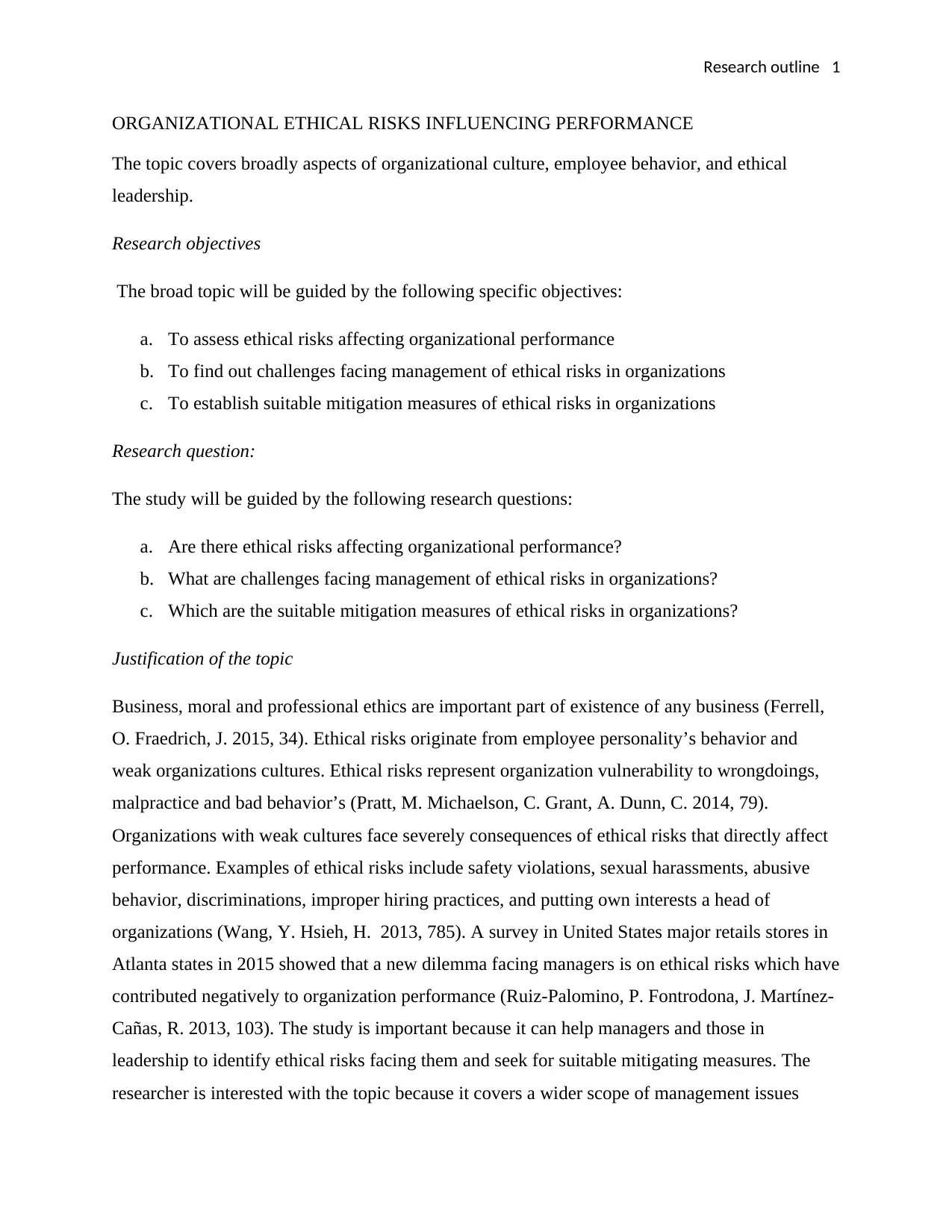
Research outline 1
ORGANIZATIONAL ETHICAL RISKS INFLUENCING PERFORMANCE
The topic covers broadly aspects of organizational culture, employee behavior, and ethical
leadership.
Research objectives
The broad topic will be guided by the following specific objectives:
a. To assess ethical risks affecting organizational performance
b. To find out challenges facing management of ethical risks in organizations
c. To establish suitable mitigation measures of ethical risks in organizations
Research question:
The study will be guided by the following research questions:
a. Are there ethical risks affecting organizational performance?
b. What are challenges facing management of ethical risks in organizations?
c. Which are the suitable mitigation measures of ethical risks in organizations?
Justification of the topic
Business, moral and professional ethics are important part of existence of any business (Ferrell,
O. Fraedrich, J. 2015, 34). Ethical risks originate from employee personality’s behavior and
weak organizations cultures. Ethical risks represent organization vulnerability to wrongdoings,
malpractice and bad behavior’s (Pratt, M. Michaelson, C. Grant, A. Dunn, C. 2014, 79).
Organizations with weak cultures face severely consequences of ethical risks that directly affect
performance. Examples of ethical risks include safety violations, sexual harassments, abusive
behavior, discriminations, improper hiring practices, and putting own interests a head of
organizations (Wang, Y. Hsieh, H. 2013, 785). A survey in United States major retails stores in
Atlanta states in 2015 showed that a new dilemma facing managers is on ethical risks which have
contributed negatively to organization performance (Ruiz-Palomino, P. Fontrodona, J. Martínez-
Cañas, R. 2013, 103). The study is important because it can help managers and those in
leadership to identify ethical risks facing them and seek for suitable mitigating measures. The
researcher is interested with the topic because it covers a wider scope of management issues
ORGANIZATIONAL ETHICAL RISKS INFLUENCING PERFORMANCE
The topic covers broadly aspects of organizational culture, employee behavior, and ethical
leadership.
Research objectives
The broad topic will be guided by the following specific objectives:
a. To assess ethical risks affecting organizational performance
b. To find out challenges facing management of ethical risks in organizations
c. To establish suitable mitigation measures of ethical risks in organizations
Research question:
The study will be guided by the following research questions:
a. Are there ethical risks affecting organizational performance?
b. What are challenges facing management of ethical risks in organizations?
c. Which are the suitable mitigation measures of ethical risks in organizations?
Justification of the topic
Business, moral and professional ethics are important part of existence of any business (Ferrell,
O. Fraedrich, J. 2015, 34). Ethical risks originate from employee personality’s behavior and
weak organizations cultures. Ethical risks represent organization vulnerability to wrongdoings,
malpractice and bad behavior’s (Pratt, M. Michaelson, C. Grant, A. Dunn, C. 2014, 79).
Organizations with weak cultures face severely consequences of ethical risks that directly affect
performance. Examples of ethical risks include safety violations, sexual harassments, abusive
behavior, discriminations, improper hiring practices, and putting own interests a head of
organizations (Wang, Y. Hsieh, H. 2013, 785). A survey in United States major retails stores in
Atlanta states in 2015 showed that a new dilemma facing managers is on ethical risks which have
contributed negatively to organization performance (Ruiz-Palomino, P. Fontrodona, J. Martínez-
Cañas, R. 2013, 103). The study is important because it can help managers and those in
leadership to identify ethical risks facing them and seek for suitable mitigating measures. The
researcher is interested with the topic because it covers a wider scope of management issues
Paraphrase This Document
Need a fresh take? Get an instant paraphrase of this document with our AI Paraphraser
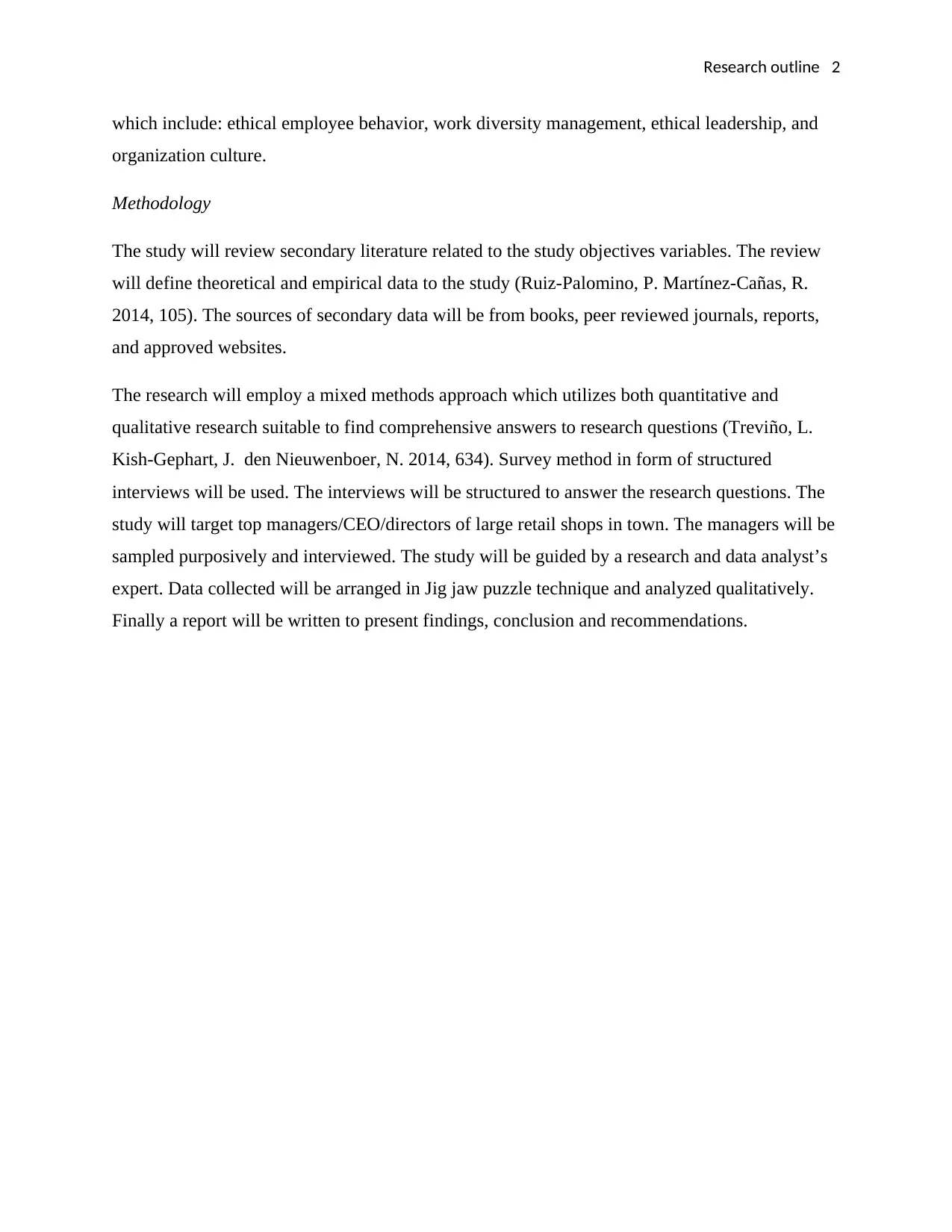
Research outline 2
which include: ethical employee behavior, work diversity management, ethical leadership, and
organization culture.
Methodology
The study will review secondary literature related to the study objectives variables. The review
will define theoretical and empirical data to the study (Ruiz-Palomino, P. Martínez-Cañas, R.
2014, 105). The sources of secondary data will be from books, peer reviewed journals, reports,
and approved websites.
The research will employ a mixed methods approach which utilizes both quantitative and
qualitative research suitable to find comprehensive answers to research questions (Treviño, L.
Kish-Gephart, J. den Nieuwenboer, N. 2014, 634). Survey method in form of structured
interviews will be used. The interviews will be structured to answer the research questions. The
study will target top managers/CEO/directors of large retail shops in town. The managers will be
sampled purposively and interviewed. The study will be guided by a research and data analyst’s
expert. Data collected will be arranged in Jig jaw puzzle technique and analyzed qualitatively.
Finally a report will be written to present findings, conclusion and recommendations.
which include: ethical employee behavior, work diversity management, ethical leadership, and
organization culture.
Methodology
The study will review secondary literature related to the study objectives variables. The review
will define theoretical and empirical data to the study (Ruiz-Palomino, P. Martínez-Cañas, R.
2014, 105). The sources of secondary data will be from books, peer reviewed journals, reports,
and approved websites.
The research will employ a mixed methods approach which utilizes both quantitative and
qualitative research suitable to find comprehensive answers to research questions (Treviño, L.
Kish-Gephart, J. den Nieuwenboer, N. 2014, 634). Survey method in form of structured
interviews will be used. The interviews will be structured to answer the research questions. The
study will target top managers/CEO/directors of large retail shops in town. The managers will be
sampled purposively and interviewed. The study will be guided by a research and data analyst’s
expert. Data collected will be arranged in Jig jaw puzzle technique and analyzed qualitatively.
Finally a report will be written to present findings, conclusion and recommendations.
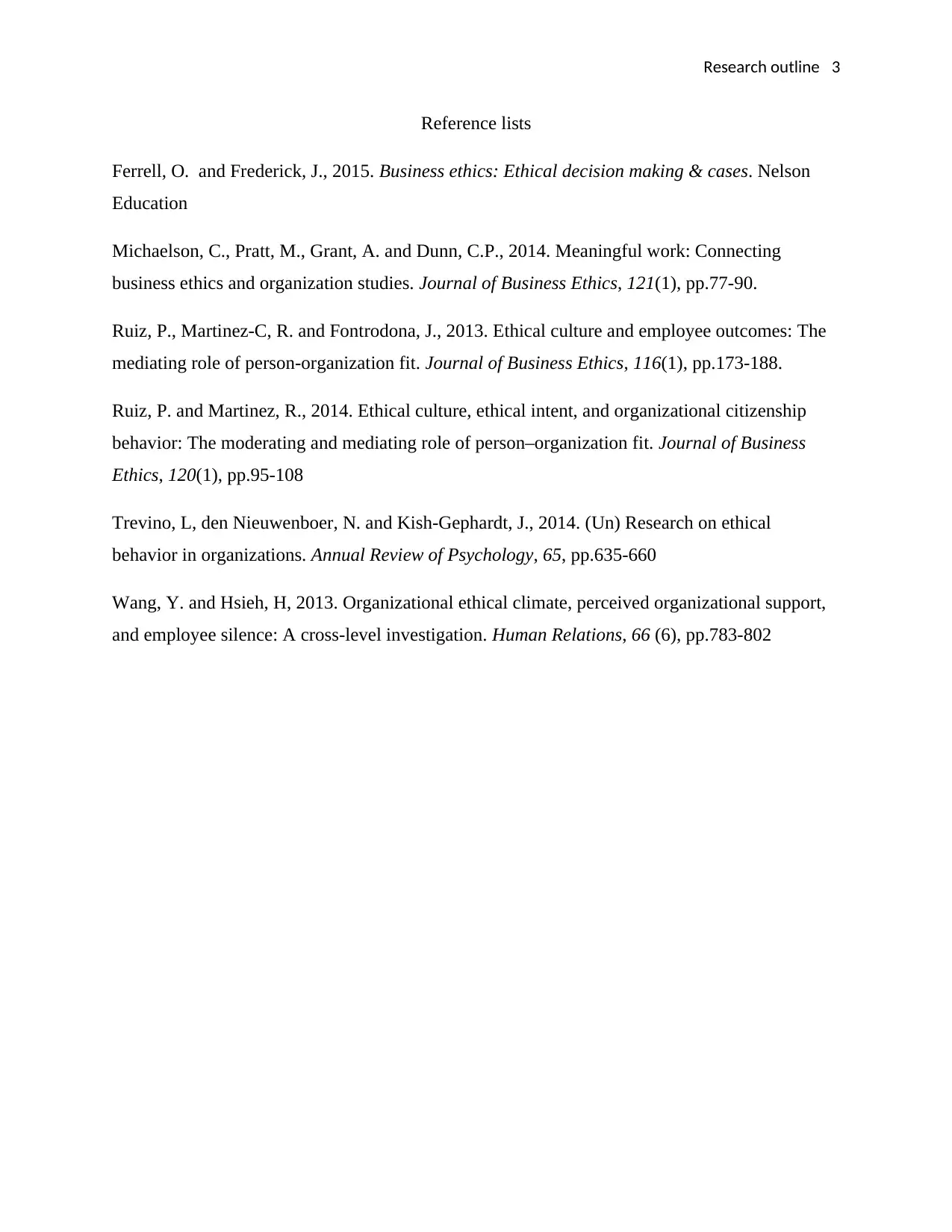
Research outline 3
Reference lists
Ferrell, O. and Frederick, J., 2015. Business ethics: Ethical decision making & cases. Nelson
Education
Michaelson, C., Pratt, M., Grant, A. and Dunn, C.P., 2014. Meaningful work: Connecting
business ethics and organization studies. Journal of Business Ethics, 121(1), pp.77-90.
Ruiz, P., Martinez-C, R. and Fontrodona, J., 2013. Ethical culture and employee outcomes: The
mediating role of person-organization fit. Journal of Business Ethics, 116(1), pp.173-188.
Ruiz, P. and Martinez, R., 2014. Ethical culture, ethical intent, and organizational citizenship
behavior: The moderating and mediating role of person–organization fit. Journal of Business
Ethics, 120(1), pp.95-108
Trevino, L, den Nieuwenboer, N. and Kish-Gephardt, J., 2014. (Un) Research on ethical
behavior in organizations. Annual Review of Psychology, 65, pp.635-660
Wang, Y. and Hsieh, H, 2013. Organizational ethical climate, perceived organizational support,
and employee silence: A cross-level investigation. Human Relations, 66 (6), pp.783-802
Reference lists
Ferrell, O. and Frederick, J., 2015. Business ethics: Ethical decision making & cases. Nelson
Education
Michaelson, C., Pratt, M., Grant, A. and Dunn, C.P., 2014. Meaningful work: Connecting
business ethics and organization studies. Journal of Business Ethics, 121(1), pp.77-90.
Ruiz, P., Martinez-C, R. and Fontrodona, J., 2013. Ethical culture and employee outcomes: The
mediating role of person-organization fit. Journal of Business Ethics, 116(1), pp.173-188.
Ruiz, P. and Martinez, R., 2014. Ethical culture, ethical intent, and organizational citizenship
behavior: The moderating and mediating role of person–organization fit. Journal of Business
Ethics, 120(1), pp.95-108
Trevino, L, den Nieuwenboer, N. and Kish-Gephardt, J., 2014. (Un) Research on ethical
behavior in organizations. Annual Review of Psychology, 65, pp.635-660
Wang, Y. and Hsieh, H, 2013. Organizational ethical climate, perceived organizational support,
and employee silence: A cross-level investigation. Human Relations, 66 (6), pp.783-802
⊘ This is a preview!⊘
Do you want full access?
Subscribe today to unlock all pages.

Trusted by 1+ million students worldwide
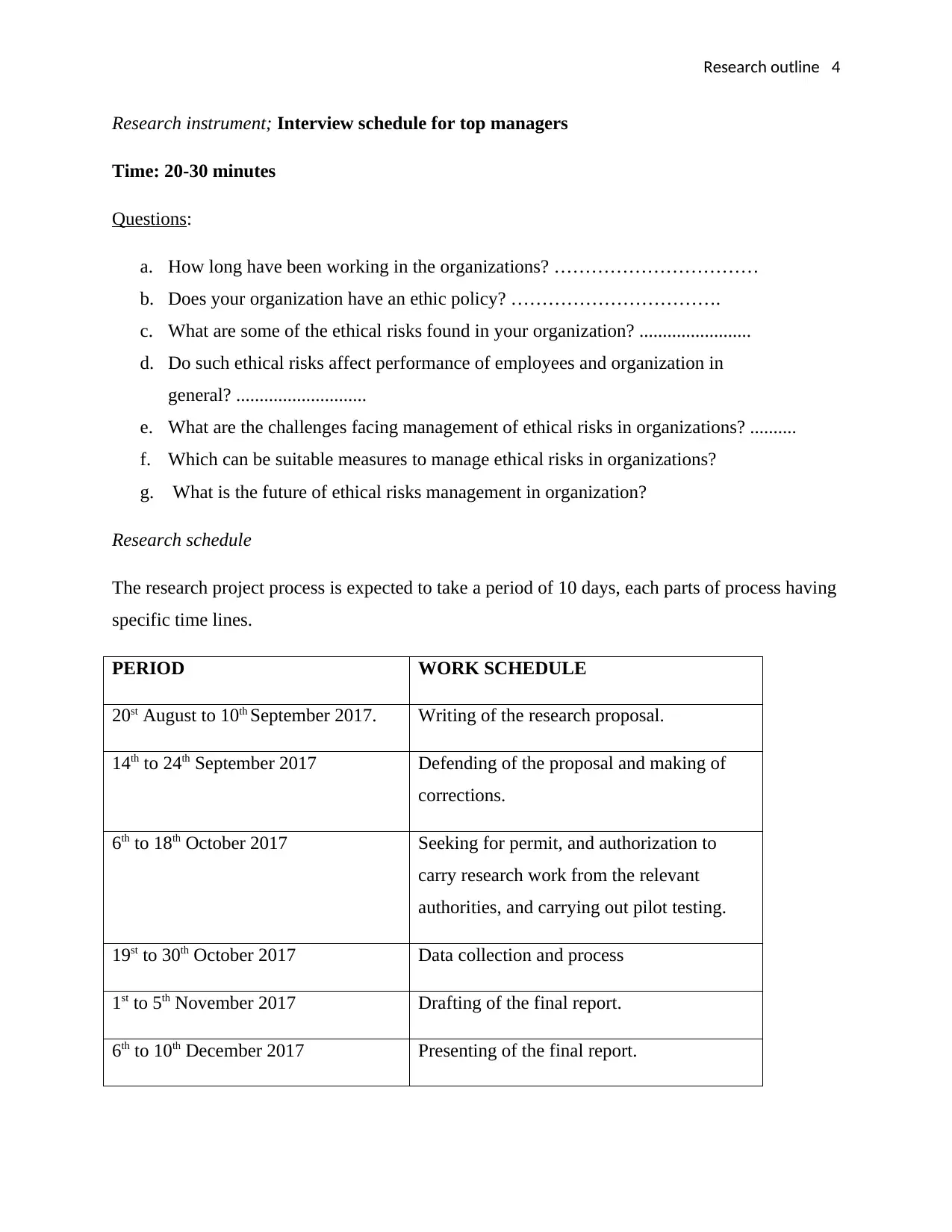
Research outline 4
Research instrument; Interview schedule for top managers
Time: 20-30 minutes
Questions:
a. How long have been working in the organizations? ……………………………
b. Does your organization have an ethic policy? …………………………….
c. What are some of the ethical risks found in your organization? ........................
d. Do such ethical risks affect performance of employees and organization in
general? ............................
e. What are the challenges facing management of ethical risks in organizations? ..........
f. Which can be suitable measures to manage ethical risks in organizations?
g. What is the future of ethical risks management in organization?
Research schedule
The research project process is expected to take a period of 10 days, each parts of process having
specific time lines.
PERIOD WORK SCHEDULE
20st August to 10th September 2017. Writing of the research proposal.
14th to 24th September 2017 Defending of the proposal and making of
corrections.
6th to 18th October 2017 Seeking for permit, and authorization to
carry research work from the relevant
authorities, and carrying out pilot testing.
19st to 30th October 2017 Data collection and process
1st to 5th November 2017 Drafting of the final report.
6th to 10th December 2017 Presenting of the final report.
Research instrument; Interview schedule for top managers
Time: 20-30 minutes
Questions:
a. How long have been working in the organizations? ……………………………
b. Does your organization have an ethic policy? …………………………….
c. What are some of the ethical risks found in your organization? ........................
d. Do such ethical risks affect performance of employees and organization in
general? ............................
e. What are the challenges facing management of ethical risks in organizations? ..........
f. Which can be suitable measures to manage ethical risks in organizations?
g. What is the future of ethical risks management in organization?
Research schedule
The research project process is expected to take a period of 10 days, each parts of process having
specific time lines.
PERIOD WORK SCHEDULE
20st August to 10th September 2017. Writing of the research proposal.
14th to 24th September 2017 Defending of the proposal and making of
corrections.
6th to 18th October 2017 Seeking for permit, and authorization to
carry research work from the relevant
authorities, and carrying out pilot testing.
19st to 30th October 2017 Data collection and process
1st to 5th November 2017 Drafting of the final report.
6th to 10th December 2017 Presenting of the final report.
Paraphrase This Document
Need a fresh take? Get an instant paraphrase of this document with our AI Paraphraser
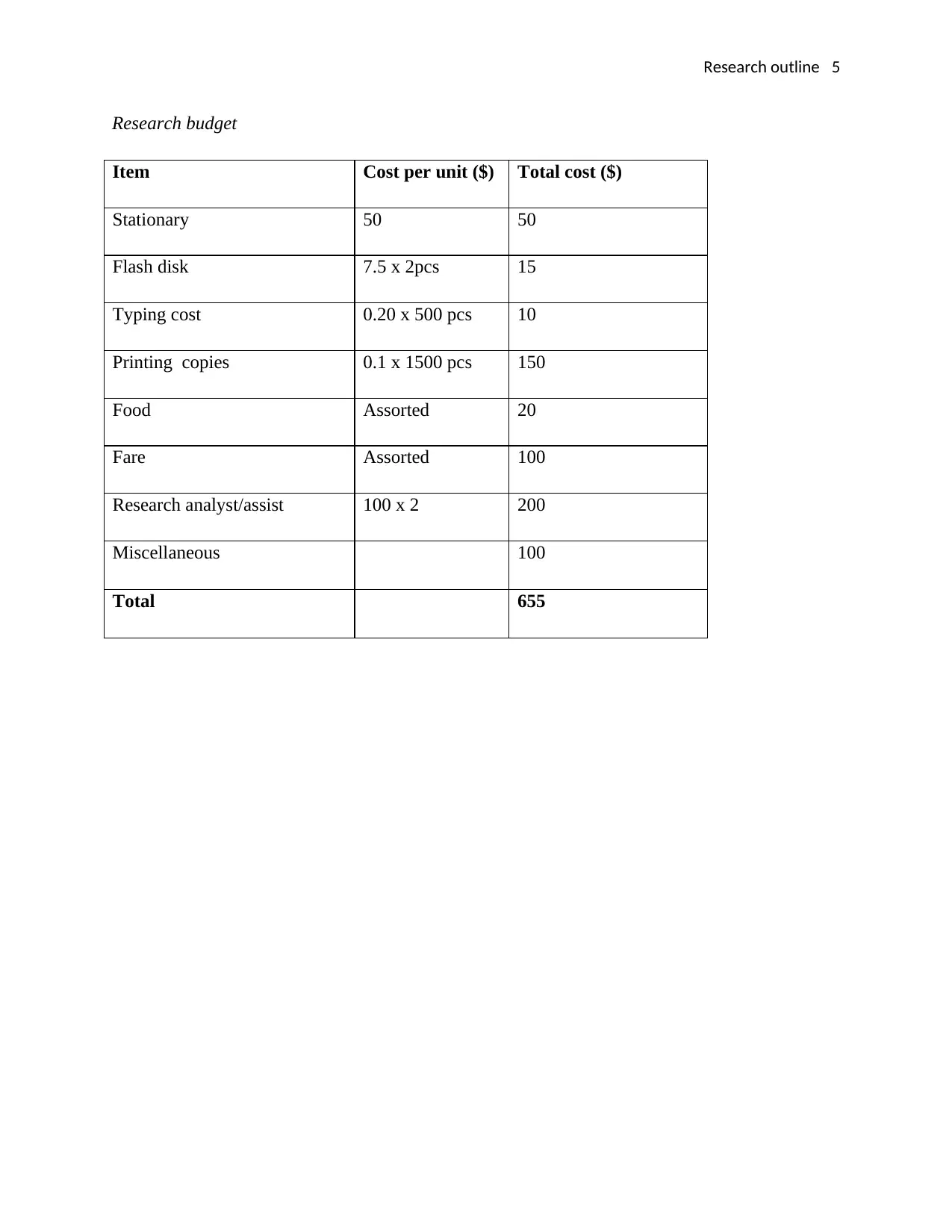
Research outline 5
Research budget
Item Cost per unit ($) Total cost ($)
Stationary 50 50
Flash disk 7.5 x 2pcs 15
Typing cost 0.20 x 500 pcs 10
Printing copies 0.1 x 1500 pcs 150
Food Assorted 20
Fare Assorted 100
Research analyst/assist 100 x 2 200
Miscellaneous 100
Total 655
Research budget
Item Cost per unit ($) Total cost ($)
Stationary 50 50
Flash disk 7.5 x 2pcs 15
Typing cost 0.20 x 500 pcs 10
Printing copies 0.1 x 1500 pcs 150
Food Assorted 20
Fare Assorted 100
Research analyst/assist 100 x 2 200
Miscellaneous 100
Total 655
1 out of 5
Your All-in-One AI-Powered Toolkit for Academic Success.
+13062052269
info@desklib.com
Available 24*7 on WhatsApp / Email
![[object Object]](/_next/static/media/star-bottom.7253800d.svg)
Unlock your academic potential
Copyright © 2020–2026 A2Z Services. All Rights Reserved. Developed and managed by ZUCOL.


